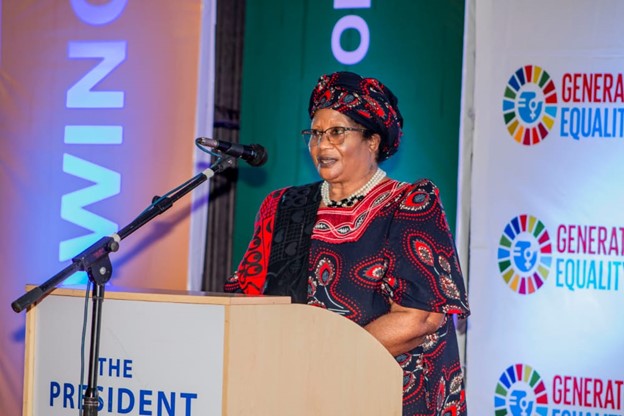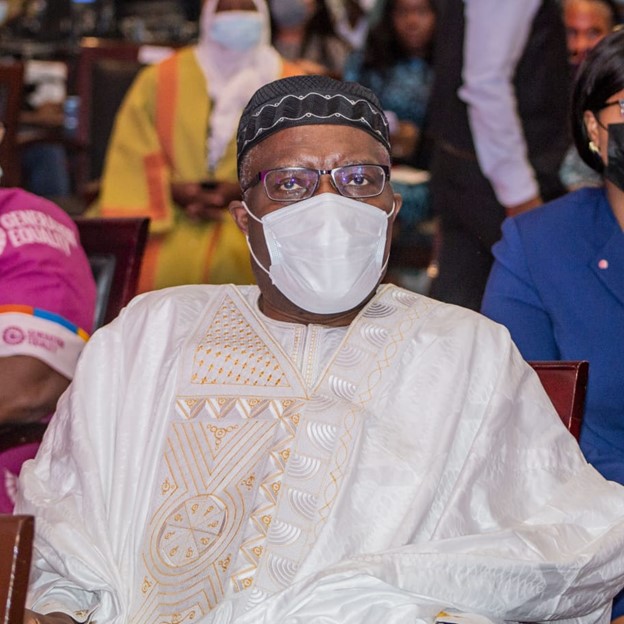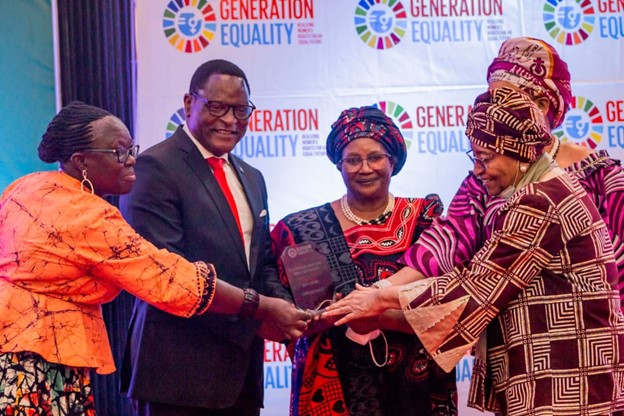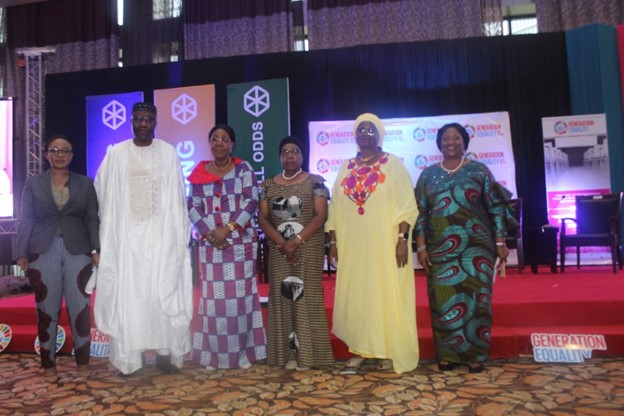|
From Malawi A Fresh Call On Leaders To Bridge Gender
Disparities
May, 2022
 Former Malawian President Joyce Banda was instrumental in putting the
forum together.Photo, Joseph Dumbula,PAV
Former Malawian President Joyce Banda was instrumental in putting the
forum together.Photo, Joseph Dumbula,PAV
Top African leaders engaged in a high-level meeting from 9th to
12th April in Lilongwe, Malawi's capital for the Generation Equality
Conference where centrally, a substantial challenge was placed on regimes across
the region for soul searching to end growing differences between men and women.
Drawn from across distinct experiences and fields, the delegates filled up the
Bingu Conference Centre which lies close to Malawi Parliament held a series of
interactions most of which exposed issues lack dwindling efforts for financial
inclusion, stereotypes, physical and mental assault, all which have evidently
caused gender disparities continent wide.
More so, the donor community while making commitments to support various efforts
to improve the welfare of women noted that, there is need for gender related
projects to primarily be resolved on mindset change.
Some of the high-profile people in attendance were Malawi President Lazarus
Chakwera who opened the conference, the First Lady, Former Malawi President,
Joyce Banda, the country's first female leader, Ellen Johnson Sirleaf, Former
Liberia President, Catherine Panza, former President of the Central African
Republic, Jewel Taylor, Vice President of Liberia and Joyce Mujuru, Former Vice
President for Zimbabwe, Dr Christopher Fomunyoh, Senior Advocate and Regional
Director for Central and West Africa for the National Democratic Institute as
well as members form international and regional organizations.
Chakwera was in his opening remarks quick to state that conference gives leaders
a right time to reflect on flaws of various policies that appear essentially to
impinge on women.
His core statement was: "That is why my administration will push in the next
election for unified parliamentary representation. Let us take insights from
this engagement with seriousness these issues deserve."
 Dr Christopher Fomunyoh following proceedings on the opening day.Photo,
Joseph Dumbula,PAV
Dr Christopher Fomunyoh following proceedings on the opening day.Photo,
Joseph Dumbula,PAV
Speaking during a panel discussion that also had Mujuru, Panza and Taylor, Dr
Christopher Fomunyoh, noted that nations are left with unprecedent tasks to
uniformly tame challenges that women are facing.
According to Dr Fomunyoh, African nations should go beyond usual formulation of
policies but must essentially work into putting them into use.
He then challenged leaders to appreciate how narratives about women empowerment
are changing across the world, a thing he says demonstrates that efforts to
empower women are now taking center stage.
Earlier on, Shigeki Komatsubara, United Nations resident Coordinator pledged the
organization's support for nations in the region in a bid to beef up the
effectiveness of various development agendas such as the Vision 2063, which
Malawi is now enforcing. PAV caught up with Dr Christopher Fomunyoh a leading
resource person at the forum for more insights and the road Africa needs to
travel in the challenging task of bridging gender disparities.
 President Chakwera receiving a gift from Sirleaf and Banda on his
government's efforts in promoting women.Photo, Joseph Dumbula,PAV
President Chakwera receiving a gift from Sirleaf and Banda on his
government's efforts in promoting women.Photo, Joseph Dumbula,PAV
You attended a high-level interaction on a series of events marking the
Generation Equality Conference in Lilongwe, Malawi's capital. You also took
part in a special panel discussion on gender insights across the region.
What were your key messages in the discussion?
Dr Fomunyoh: First, I listened in awe and learned a lot from
the fabulous women leaders and former presidents present who have served in
the highest offices in the land in their respective countries and made their
countries and the continent of Africa proud. I'm referring to former
president Joyce Banda of Malawi who was the prime convenor of the
conference, former president Ellen Johnson Sirleaf of Liberia, the first
woman elected president in Africa and the only woman to have served two full
terms of 12 years total, and former transition president Catherine
Samba-Panza of the Central Africa Republic.
These are great world leaders who just happen to be African, and we have to
honor them and celebrate their success as trailblazers and a source of
inspiration for the younger generation of African women. I then made two
principal points: one, that while we acknowledge these rare gems of success,
we must recognize that a lot still needs to be done on gender equality and
women's empowerment across the continent; and two, that we must go beyond
declarations like came out of the Beijing conference 25 years ago or the UN
security Council resolution 1325 on the inclusion of women in peacemaking
and peacebuilding, and take concrete steps to enhance and speed up women's
access to political and economic power on a continent where women make up
more than 50 percent of the population and are the pillars of our families
and communities.
One of the issues raised had to do with poor financial inclusion of women
in money lending institutions, how big of problem is this?
Dr Fomunyoh: Lack of financial resources needed to propel
women to positions of economic autonomy and political leadership remains a
significant drawback for women across the continent. This situation is
triggered by the combination of traditional and customary norms that in many
countries make it difficult for women to earn and accumulate wealth as well
as the challenges of accessing modern mechanisms of fundraising and resource
mobilization.
It was very heartening that during the Lilongwe conference one of the major
financial institutions of Malawi stepped forward and opened a facility to
provide access and training to women so they could benefit from electronic
banking which is now commonplace in most of our countries. Even the regional
body COMESA promised to open a center to support women entrepreneurs across
the region, to be based in Lilongwe, Malawi.
African countries must reform the laws on matters such as land tenure,
inheritance and succession to give women equal rights and opportunities as
men. Come to think of it, it is really absurd that women give birth to us
males, and then we get into power and suddenly treat them as less equal to
us. This is not simply unequal or unfair; it is inhumane, nonsensical and
very counterintuitive to the economic and political development that we seek
for our peoples and countries.
Some of the high-level speakers challenged African governments to empower
women and girls across the region, why do you think governments have
generally not done more to bridge the gender gap?
Dr Fomunyoh: It's a question of leaders having the political
will to do right by providing equal opportunities to all its citizens and
lacking a vision that seeks to raise the wellbeing of all citizens without
bias based on gender or other form of difference. These leaders should look
at the statistics of how women leaders are better performers on so many
indicators of governance.
 Panelists pose after a discussion focused on shared experiences.Photo,
Joseph Dumbula,PAV
Panelists pose after a discussion focused on shared experiences.Photo,
Joseph Dumbula,PAV
What other suggestions do you have on the way forward?
Dr Fomunyoh: We need all African leaders to demonstrate
boldness in their policies on equity and inclusion such as we see in Rwanda
where over 50 percent of legislative seats are held by women, or in Niger
where, despite many cultural impediments, genuine efforts are being made to
enhance the access to education for young girls, or Tanzania where President
Samia Hassan, now the only female Head of State in Africa, is providing
ample opportunities for women in her cabinet or government and in other
positions of influence.
I was impressed to hear from President Chakwera of Malawi that 41 percent of
his cabinet ministers are female, as are 45 percent of the diplomatic corps
and 50 percent of judicial appointments. President Chakwera pledged during
the conference to do more towards achieving gender parity between now and
2025. These progressive, forward-looking leaders should engage their
colleagues and the continental body, the African Union, to respond
positively and aggressively to the aspirations of African women and
democrats as a whole as we march into the 21st century.
panafricanvisions.com
Dr. Christopher Fomunyoh
Président, The Fomunyoh Foundation
christopher.fomunyoh@tffcam.org
www.tffcam.org
|

